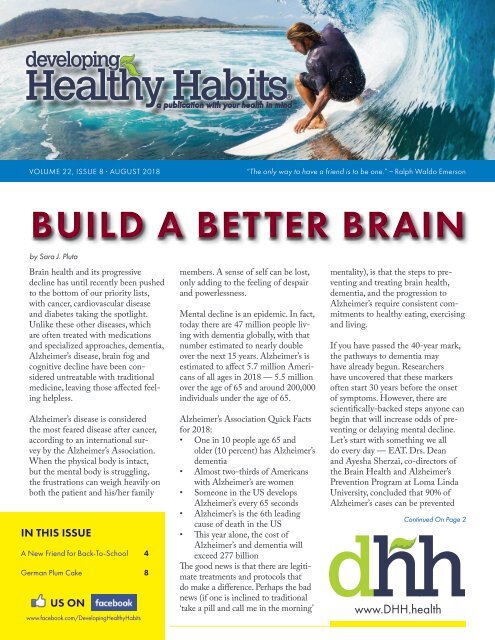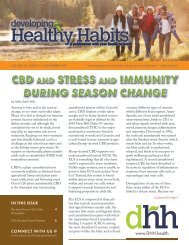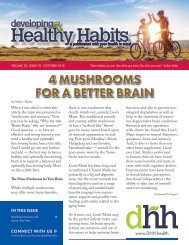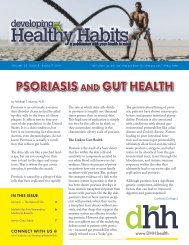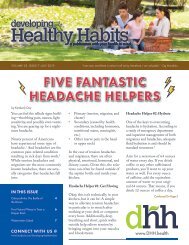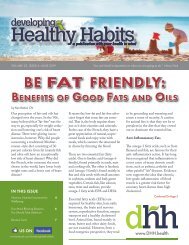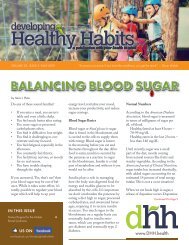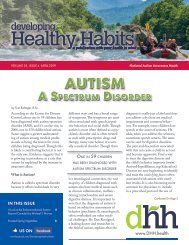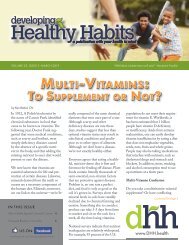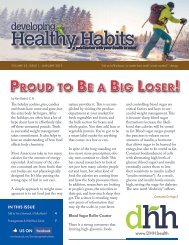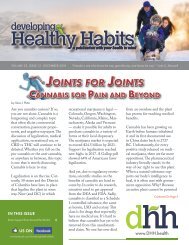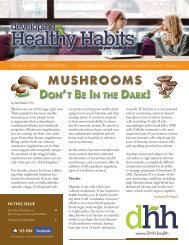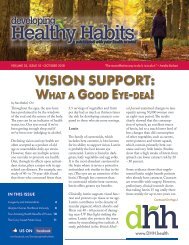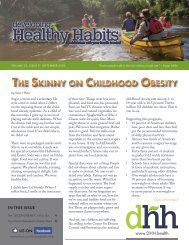August 2018
You also want an ePaper? Increase the reach of your titles
YUMPU automatically turns print PDFs into web optimized ePapers that Google loves.
VOLUME 22, ISSUE 8 · AUGUST <strong>2018</strong><br />
“The only way to have a friend is to be one.” ~ Ralph Waldo Emerson<br />
BUILD A BETTER BRAIN<br />
by Sara J. Pluta<br />
Brain health and its progressive<br />
decline has until recently been pushed<br />
to the bottom of our priority lists,<br />
with cancer, cardiovascular disease<br />
and diabetes taking the spotlight.<br />
Unlike these other diseases, which<br />
are often treated with medications<br />
and specialized approaches, dementia,<br />
Alzheimer’s disease, brain fog and<br />
cognitive decline have been considered<br />
untreatable with traditional<br />
medicine, leaving those affected feeling<br />
helpless.<br />
Alzheimer’s disease is considered<br />
the most feared disease after cancer,<br />
according to an international survey<br />
by the Alzheimer’s Association.<br />
When the physical body is intact,<br />
but the mental body is struggling,<br />
the frustrations can weigh heavily on<br />
both the patient and his/her family<br />
IN THIS ISSUE<br />
A New Friend for Back-To-School<br />
German Plum Cake<br />
US ON<br />
www.facebook.com/DevelopingHealthyHabits<br />
4<br />
8<br />
members. A sense of self can be lost,<br />
only adding to the feeling of despair<br />
and powerlessness.<br />
Mental decline is an epidemic. In fact,<br />
today there are 47 million people living<br />
with dementia globally, with that<br />
number estimated to nearly double<br />
over the next 15 years. Alzheimer’s is<br />
estimated to affect 5.7 million Americans<br />
of all ages in <strong>2018</strong> — 5.5 million<br />
over the age of 65 and around 200,000<br />
individuals under the age of 65.<br />
Alzheimer’s Association Quick Facts<br />
for <strong>2018</strong>:<br />
• One in 10 people age 65 and<br />
older (10 percent) has Alzheimer’s<br />
dementia<br />
• Almost two-thirds of Americans<br />
with Alzheimer’s are women<br />
• Someone in the US develops<br />
Alzheimer’s every 65 seconds<br />
• Alzheimer’s is the 6th leading<br />
cause of death in the US<br />
• This year alone, the cost of<br />
Alzheimer’s and dementia will<br />
exceed 277 billion<br />
The good news is that there are legitimate<br />
treatments and protocols that<br />
do make a difference. Perhaps the bad<br />
news (if one is inclined to traditional<br />
‘take a pill and call me in the morning’<br />
mentality), is that the steps to preventing<br />
and treating brain health,<br />
dementia, and the progression to<br />
Alzheimer’s require consistent commitments<br />
to healthy eating, exercising<br />
and living.<br />
If you have passed the 40-year mark,<br />
the pathways to dementia may<br />
have already begun. Researchers<br />
have uncovered that these markers<br />
often start 30 years before the onset<br />
of symptoms. However, there are<br />
scientifically-backed steps anyone can<br />
begin that will increase odds of preventing<br />
or delaying mental decline.<br />
Let’s start with something we all<br />
do every day — EAT. Drs. Dean<br />
and Ayesha Sherzai, co-directors of<br />
the Brain Health and Alzheimer’s<br />
Prevention Program at Loma Linda<br />
University, concluded that 90% of<br />
Alzheimer’s cases can be prevented<br />
Continued On Page 2<br />
www.DHH.health
BETTER BRAIN — Continued from Page 1<br />
Developing Healthy Habits<br />
Published by:<br />
Developing Healthy Habits, LLC.<br />
3275 S. John Young Parkway, Suite 152<br />
Kissimmee, FL 34746<br />
1-800-713-2802<br />
www.DHH.health<br />
Executive Editor<br />
Mark A. Carroll<br />
Mark@DevelopingHealthyHabits.com<br />
Managing Editor<br />
Sandra Michalski<br />
Associate Editor<br />
Nicholas A. Carroll<br />
Design<br />
NXS Designs<br />
JAM Graphics Design<br />
Contributors<br />
Mark J. Kaylor<br />
Sara J. Pluta<br />
To subscribe visit:<br />
www.DHH.health<br />
For content contribution contact:<br />
Sandra@DevelopingHealthyHabits.com<br />
For advertising inquires contact:<br />
Nick@DevelopingHealthyHabits.com<br />
Mission Statement<br />
“Our mission is to continually provide<br />
a well written and clearly presented newsletter<br />
that is devoted to empowering individuals<br />
to make educated decisions relating to their<br />
health and wellness.”<br />
The statements and products in this newsletter<br />
have not been evaluated by the Food and Drug<br />
Administration and are not intended to diagnose,<br />
treat, cure or prevent any disease.<br />
with conscious shifts in diet and<br />
lifestyle. 90% is HUGE!<br />
Supportive dietary choices make an<br />
enormous difference in the prevention<br />
of the disease, but also how you<br />
feel right now. Reducing sugar and<br />
refined carbohydrates and adding in<br />
quality proteins and healthy fats with<br />
every meal prevents the blood sugar<br />
rollercoaster. Low blood glucose<br />
often results in brain fog. Over time,<br />
the inflammatory response from<br />
sugar and refined carbohydrates can<br />
wreak havoc on brain health.<br />
Gluten, a common food allergen,<br />
can cause inflammation in the brain,<br />
leading to brain fog and mental<br />
decline. In fact, any food that elicits<br />
an inflammatory response in the<br />
body, either due to food sensitivities<br />
or other factors, is definitely something<br />
to avoid. For you, this may be<br />
dairy, soy, eggs, corn, nuts, etc. Pay<br />
attention to how you feel and consult<br />
a qualified nutrition coach or professional<br />
to help you unravel your diet.<br />
While staying away from sugar,<br />
refined carbohydrates, and reactionary<br />
foods is paramount, it is<br />
also crucial to make sure you are<br />
getting enough high-quality oils<br />
and fats like those found in olives,<br />
avocados, coconut, nuts, seeds, egg<br />
yolks, grass-fed meats, fatty fish like<br />
salmon, sardines, and anchovies,<br />
and grass-fed butter. Fats are some<br />
of the most important nutrients<br />
for brain health. A 2014 study<br />
published in Neurology found that<br />
having Omega-3 fatty acids circulating<br />
in the body is linked to larger<br />
brains. DHA, specifically, makes up<br />
about 97% of the brain and 93%<br />
of the retina of the eye. Having<br />
adequate levels of DHA can protect<br />
you from age-related mental<br />
decline and drastically reduce the<br />
risk of dementia and Alzheimer’s.<br />
Seniors with higher levels of DHA<br />
are 47% less likely to develop<br />
dementia and 39% less likely to<br />
develop Alzheimer’s.<br />
Eating foods high in choline, a<br />
brain bolstering nutrient found<br />
in dark greens, organ meats, and<br />
egg yolks, can protect the nervous<br />
system, boost cognitive output, and<br />
help prevent degenerative diseases.<br />
Go to your local butcher and ask for<br />
organic, grass-fed liver, sauté it up<br />
with pasture-raised eggs, butter, and<br />
a pile of greens from your farmer’s<br />
market, and your brain and belly<br />
will be delighted!<br />
Superfoods are popular right now,<br />
and rightly so. These powerful foods<br />
offer key minerals, vitamins, antioxidants,<br />
flavonoids, polyphenols,<br />
and other unique phytonutrients<br />
that feed the brain. Some of the top<br />
superfoods proven to have brainboosting<br />
benefits that you may<br />
have in your pantry right now are<br />
turmeric, blueberries, greens, coffee,<br />
tea, dark chocolate, rosemary oil,<br />
egg yolks, red grapes, and walnuts.<br />
When you begin incorporating<br />
these foods into your diet, you will<br />
not only help prevent later onset,<br />
but benefit from the enhanced<br />
brain-power now!<br />
Nootropics, also known as smart<br />
drugs, are cognitive enhancers,<br />
improve brain function, memory,<br />
creativity, motivation, and elevate<br />
mood. People have been using<br />
plants and herbs to enhance brain<br />
power since the beginning of<br />
recorded history. Gingko Biloba<br />
was used as a brain tonic in ancient<br />
Chinese Medicine; Ashwagandha<br />
was commonly prescribed in India<br />
to improve concentration and relieve<br />
stress; and Lion’s Mane mushroom<br />
and Bacopa Monnieri were used as<br />
memory enhancers by ancient cultures<br />
from areas around the globe.<br />
Including one or several of these<br />
in combination with B-vitamins,<br />
Continued On Page 6<br />
2 <strong>August</strong> <strong>2018</strong> • www.DHH.health
Back to school.<br />
Back to essentials.
A New Friend for<br />
Back-To-School<br />
by Mark K. Kaylor<br />
It’s white, grows on trees, has tendrils,<br />
looks like a lion’s mane, and may be<br />
your best friend for a healthy, peak<br />
mental performance school year.<br />
And… it’s a mushroom. Not usually<br />
what you think of when it comes to<br />
“back-to-school” help? What may<br />
surprise you even more is that this<br />
mushroom has been used for centuries<br />
in traditional medicine.<br />
What is this amazing mushroom?<br />
It is Hericium erinaceus, aka Lion’s<br />
Mane. This remarkable mushroom<br />
offers multiple brain fortifying activities<br />
along with a myriad collection<br />
of holistic, whole body supporting<br />
effects. So, please allow me to make<br />
a case for why you should consider<br />
adding Lion’s Mane to your back-toschool<br />
regimen.<br />
All About the Brain<br />
Can Lion’s Mane help with memory<br />
and learning? The answer, according<br />
to the research, is YES! And the<br />
benefits include overall brain health<br />
and function too. Several studies have<br />
demonstrated its ability to improve<br />
memory, focus and concentration.<br />
Other brain actions that Lion’s Mane<br />
(LM) can help with include stimulating<br />
Nerve Growth Factor, a compound<br />
your body produces triggering brain<br />
and nerve repair and growth, brain<br />
protection and neuronal survival and<br />
Continued On Page 5<br />
INTRODUCING!<br />
TEEN CHEWABLE<br />
Daily Multi Vitamin<br />
Don’t miss out on this great product.<br />
• No added sugar.<br />
• No mineral fillers.<br />
Delicious<br />
natural<br />
orange<br />
cream<br />
flavor.<br />
Chewables for<br />
the entire family!<br />
HEALTHCARE<br />
SOLUTIONS<br />
SINCE 1984<br />
Michael’s Naturopathic Programs<br />
Synergistically Complete<br />
www.michaelshealth.com<br />
4 <strong>August</strong> <strong>2018</strong> • www.DHH.health
BACK-TO-SCHOOL — Continued from Page 4<br />
outgrowth (the brain is all about connections).<br />
It doesn’t stop there. LM<br />
can also stimulate the creation of new<br />
brain cells; and who couldn’t use a few<br />
more brain cells. As far as how to use<br />
LM, research suggests that it may be<br />
best to start taking it a few weeks in<br />
advance of going back to school.<br />
Holistic Help<br />
There are a number of other health<br />
issues that become areas of concerns<br />
that accompany going back to school,<br />
including overall health, vitality and<br />
energy, sleep, mood and digestive and<br />
diet support. Let’s take these one by one:<br />
1. Lion’s Mane has long been<br />
utilized as a Qi tonic to enhance<br />
one’s overall health and vitality.<br />
Recent research that confirmed<br />
this is a study that found the<br />
polysaccharides from LM have<br />
significant anti-fatigue activities.<br />
2. Several studies have raised a<br />
major concern over the health<br />
consequences associated with<br />
insufficient sleep. LM has been<br />
found to improve overall sleep<br />
quality.<br />
3. Of crucial concern today is our<br />
children’s mental and emotional<br />
health. Numerous reports have<br />
found that depression and anxiety<br />
rates have risen significantly and<br />
rapidly among our youth in the<br />
last couple of decades. LM may<br />
offer some help here as well.<br />
Studies have found it to reduce<br />
anxiety and irritability.<br />
4. Back-to-school often brings with<br />
it a less than optimal diet. LM is<br />
said to improve overall digestive<br />
function. Studies have found it to<br />
regulate gut microbiota, restore<br />
intestinal lining and help maintain<br />
colon health. Other research<br />
has found positive benefits using<br />
LM with digestive ulcers.<br />
5. As we lose control over what our<br />
kids eat, sugar consumption will<br />
rise. LM has a blood sugar lowering<br />
effect and was found to have<br />
an anti-obesity effect as well.<br />
Lion’s Mane mushroom is a super<br />
remedy for effectively and holistically<br />
supporting and optimizing your child’s<br />
health in the coming school year.<br />
Author’s Bio:<br />
Mark J. Kaylor<br />
has been exploring<br />
holistic health and<br />
healing for close to<br />
four decades and is<br />
the founder and director of the not-forprofit<br />
Radiant Health Project. Mark can<br />
be contacted at his website:<br />
www.RadiantHealthProject.com<br />
or on facebook at<br />
www.facebook.com/RadiantHealthProject.<br />
www.DHH.health • <strong>August</strong> <strong>2018</strong> 5
ShotGlass2.375x4.75a_Layout 1 5/31/18 10:56 AM Page 1<br />
Healthier Skin & Body<br />
Look & Feel the<br />
Difference<br />
Herbal Bitter - 1st Step for<br />
Digestion, Energy &much more!<br />
• Works Fast & Delicious Flavors.<br />
• Troubled Skin Support<br />
• Gluten Free Cosmetics<br />
Since 1991 • Satisfaction Guaranteed!<br />
1-800-414-ALOE • www.aloelife.com<br />
BETTER BRAIN — Continued from Page 2<br />
magnesium and vitamin D provides<br />
essential brain nourishment.<br />
Nutrition is fundamental, but don’t<br />
forget to get adequate sleep, work<br />
on stress-reduction, and move your<br />
body regularly. The brain needs sleep<br />
to work efficiently. Even one night<br />
of poor sleep can make it hard to<br />
concentrate or recall things. Imagine<br />
what sleep deprivation does over time!<br />
Stress is increasing rapidly in our<br />
modern lives. When stress goes up, so<br />
too do cortisol levels and, at the same<br />
time, important brain chemicals plummet.<br />
This can upset the brain balance<br />
needed for optimal physiological and<br />
cognitive function. Exercise helps to<br />
reduce inflammation, promote cellular<br />
health, decrease stress, and increase<br />
mental and physical energy. Not only<br />
that, it can help to lower the dreaded<br />
cortisol spike and help restore brain<br />
chemical balance. Walk, hike, do yoga,<br />
join a gym, or play with your kids. Just<br />
make sure you move!<br />
Your brain is a complex organism<br />
and so important for a positive life<br />
experience. Supporting its 86 billion<br />
neurons and nerve cells is no small<br />
task. Encouraging peak brain health<br />
takes some effort, but it is possible.<br />
Focus on food first and be sure to get<br />
enough sleep, practice stress reduction,<br />
and participate in consistent<br />
exercise. Your brain will not only<br />
benefit today, but also help support<br />
mental acuity into old age.<br />
Author’s Bio:<br />
A keen interest in food and<br />
nutrition led Sara to pursue<br />
a culinary degree in healthsupportive<br />
cuisine and then go on to study<br />
nutrition extensively, as she earned a BS, MS,<br />
and completed coursework for her doctorate<br />
in Holistic Nutrition. Sara has been in the<br />
Natural Products Industry for over 15 years<br />
where she enjoys empowering people through<br />
education and enthusiasm. Sara is a passionate<br />
speaker and a natural teacher who blends<br />
modern science, ancient wisdom, and human<br />
interest to connect with her audience.<br />
www.natren.com<br />
©<strong>2018</strong> by Natren Inc. All rights reserved. The symbol ® denotes a registered trademark of Natren Inc. Made in the USA.<br />
These statements have not been evaluated by the Food and Drug Administration. This product is not intended to diagnose, treat, cure or prevent any disease.<br />
RDHH818<br />
6 <strong>August</strong> <strong>2018</strong> • www.DHH.health
NEW!<br />
BEST NEW SUPPLEMENT<br />
CBD HAS<br />
NOW EVOLVED<br />
THE MOST IMPORTANT THING YOU CAN DO FOR YOUR HEALTH & WELLNESS THIS YEAR<br />
ADVANCED SUPPORT FOR YOUR ENDOCANNABINOID SYSTEM<br />
Activating your Endocannabinoid System is quite possibly the most important<br />
thing you can do in establishing and maintaining optimal health.<br />
CBD<br />
ALTERNATIVE<br />
Non-Cannabis, Science-Backed<br />
Endocannabinoid Health Support<br />
www.emeraldhealthbio.com | email info@emeraldhealthbio.com<br />
www.DHH.health • <strong>August</strong> <strong>2018</strong> 7
Recipe<br />
OF THE MONTH<br />
GERMAN PLUM CAKE<br />
Prep Time: 10 minutes — Cook Time: 55 minutes — Makes: 1 cake<br />
WET INGREDIENTS<br />
1 cup full fat coconut milk<br />
¼ cup freshly squeezed lemon juice<br />
¼ cup melted mild coconut oil<br />
(or other mild tasting oil)<br />
½ tsp bitter almond essence<br />
½ cup + 2 tbsp caster sugar<br />
INGREDIENTS:<br />
9" round tin<br />
DRY INGREDIENTS<br />
1½ cup + 2 tbsp buckwheat flour<br />
2 tbsp cornflour / corn starch<br />
¾ cup finely ground almonds<br />
(or almond meal)<br />
1 tsp gluten-free certified baking soda<br />
½ tsp gluten-free certified baking powder<br />
OTHER INGREDIENTS<br />
3-5 red plums, cut into 6 slices or halves<br />
2 tsp icing sugar, to decorate (optional)<br />
DIRECTIONS:<br />
Heat up the oven to 340° F (300° F fan forced). Grease the baking tin with a very small<br />
amount of oil. Mix all the wet ingredients in a large bowl. Place a sieve over the bowl and<br />
sift through all the dry ingredients, except for the ground almonds. If you are using wheat<br />
flour, be careful not to overmix the batter as the cake will be tough.<br />
Fold in the finely ground almonds. Again, if you used regular wheat flour, take care to fold<br />
them in very gently or else the cake will be tough. Transfer the batter to a lightly greased<br />
baking tin. If your tin doesn’t have a removable bottom, it may be a good idea to place two<br />
long and wide strips of baking paper down first so that you can use them as handy tabs to<br />
make cake removal easier.<br />
Decorate with plum segments or plum halves if your plums are little. To prevent plums<br />
from sinking to the bottom, dip the side of the plum that will rest directly on the batter in a<br />
little bit of all purpose flour (or cornstarch for the GF version) first before arranging on top<br />
of the cake. Bake for about 55-60 minutes, until a toothpick comes out clean and the top is<br />
nicely browned. Once cool, remove from the tin, sprinkle the top of the cake with a little bit<br />
of icing sugar and perhaps a dusting of ground cinnamon too, if desired.<br />
“Like” us at www.facebook.com/DevelopingHealthyHabits<br />
Also, check us out at www.DHH.health


